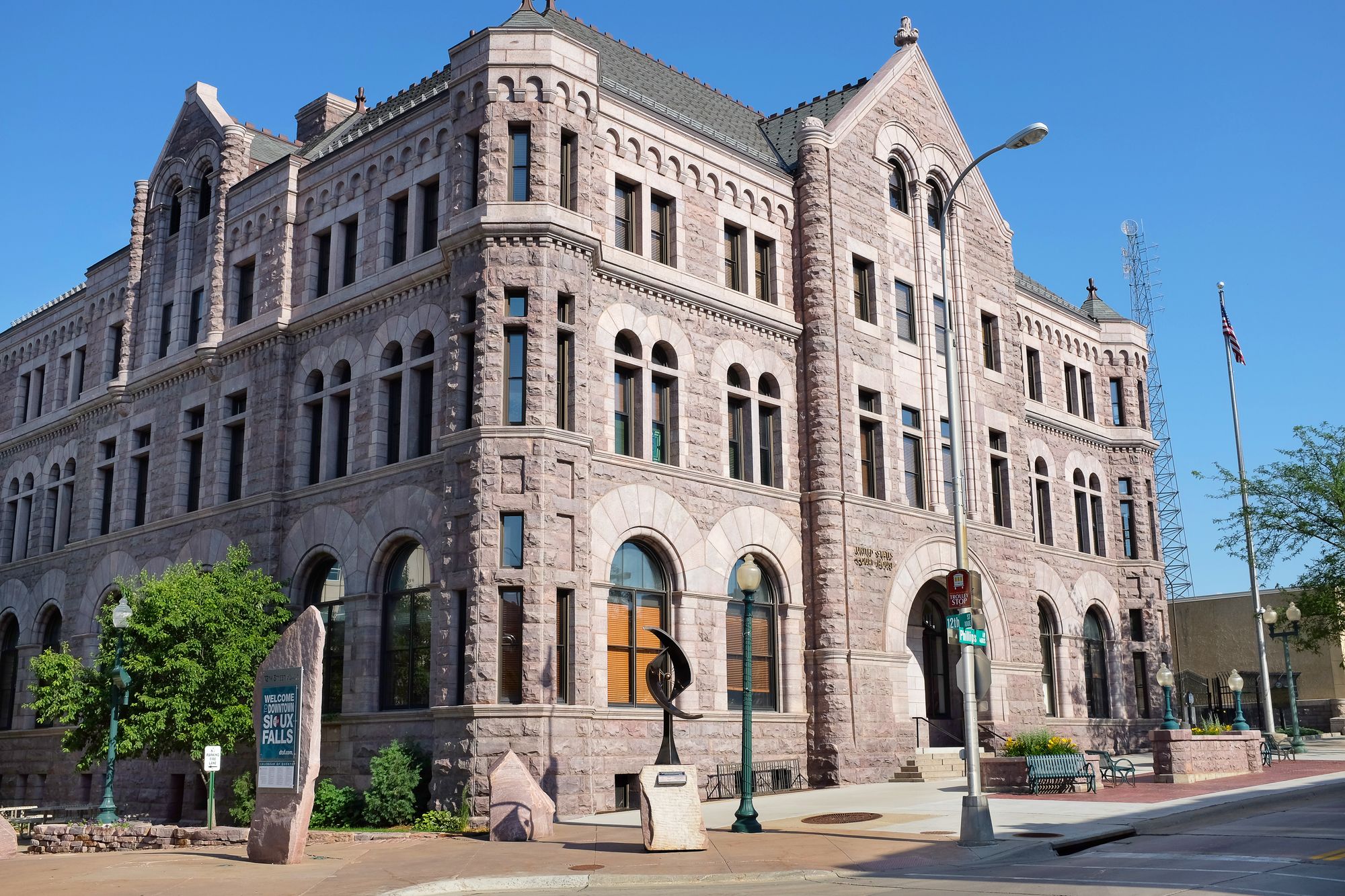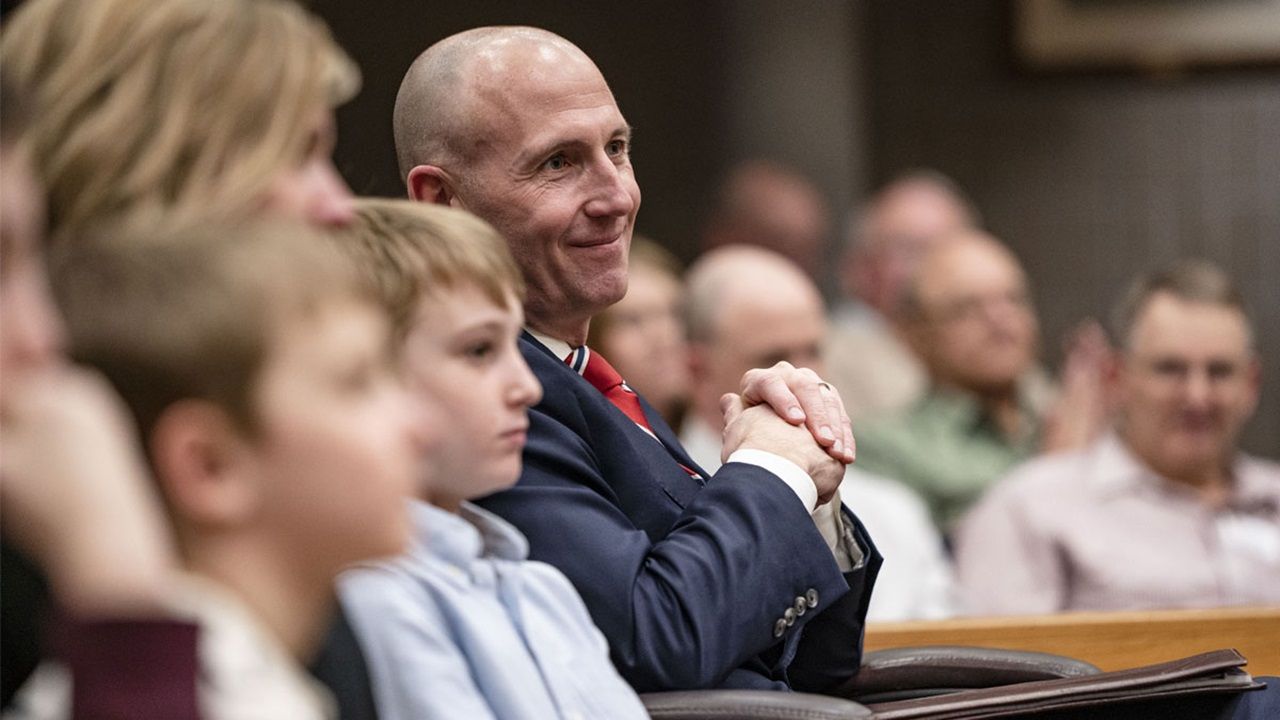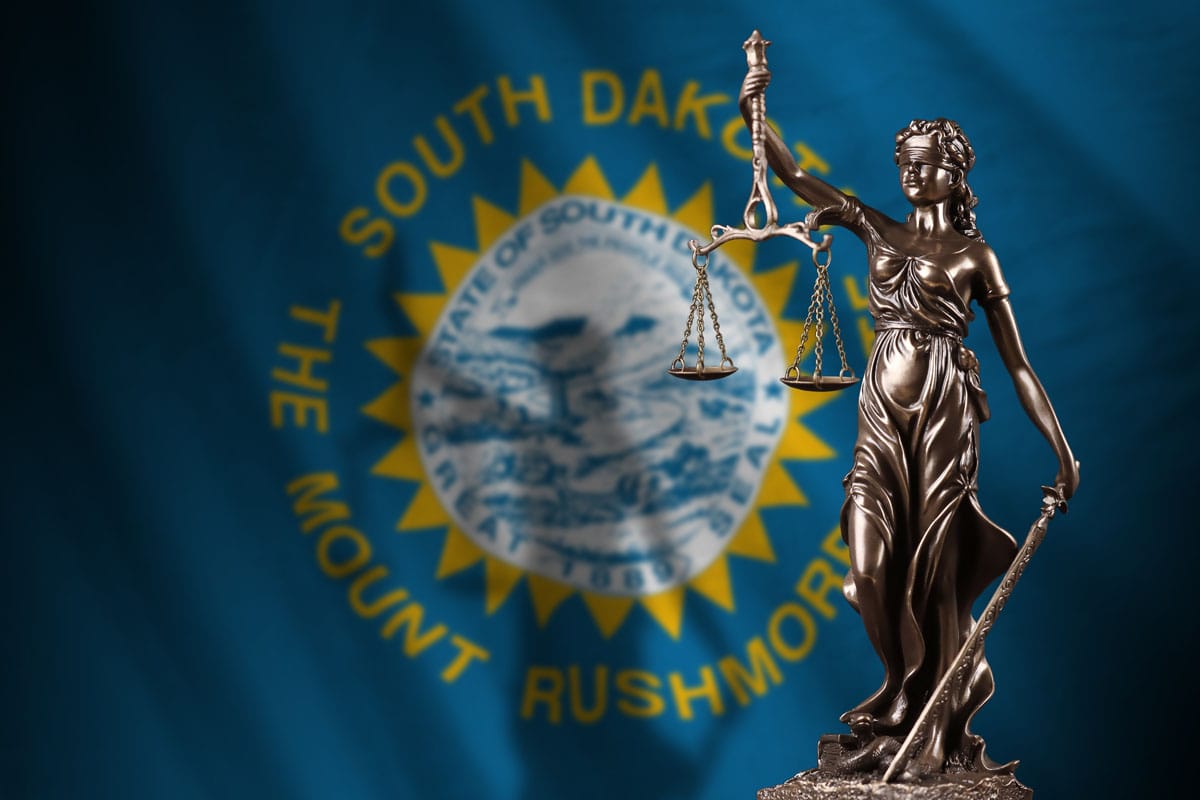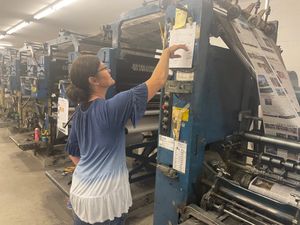For the past 20 months, South Dakota’s U.S. District Court has had a judicial vacancy waiting to be filled by President Joe Biden’s administration, prompting political scrutiny of the process and a shuffling of workloads for other federal judges.
Now the situation enters a new realm of urgency, with a looming deadline and another judge on the cusp of retirement. Biden, a Democrat up for re-election in 2024, could seat two district judges to a heavy Republican state that already has a stable of Democratic-chosen lifetime appointees from the Clinton and Obama presidencies.
Veronica Duffy, a federal magistrate judge in Sioux Falls, is the latest candidate to be recommended from South Dakota for the district bench. So why hasn’t anyone been formally nominated for approval by the U.S. Senate?
News Watch spoke with several people involved in the recommendation process, all of whom cited a variety of reasons – rather than one convenient explanation – for the delay in filling the South Dakota vacancies. They also agreed that not having the allotted number of full-time judges for nearly two years in civil and criminal courts is a problem that transcends politics.
The district of South Dakota – which consists of Southern (Sioux Falls), Northern (Aberdeen), Central (Pierre) and Western (Rapid City) divisions – handled 822 criminal and civil cases combined in 2022, according to Matt Thelen, clerk of courts.
“Federal courts in South Dakota are really busy,” said Neil Fulton, dean of the University of South Dakota School of Law and a chief of staff under former Gov. Mike Rounds.
“The criminal dockets are heavy because we have so much Indian Country jurisdiction and there’s a pretty robust civil docket, so it has a real impact on a lot of folks when there are vacancies for a long period of time.”
Judges share workload to keep up with federal cases
Judge Jeffrey Viken of Rapid City retired on Oct. 1, 2021, but took senior status, a process by which qualified judges assume a reduced workload and create a federal vacancy. Viken continues to handle most of the criminal cases in the Western Division, including 174 (87%) of the pending 200 felony cases, according to Thelen.
The rest of the division’s docket – including the entire civil caseload – has been distributed among Chief Judge Roberto Lange (Central, Northern Divisions), District Judge Karen Schreier (Southern Division), and two judges on senior status, Lawrence Piersol and Charles Kornmann.
More News Watch: Is proposed abortion amendment ‘far more extreme’ than Roe v. Wade?
Schreier announced in January that she plans to retire and take senior status upon the confirmation of her successor. That means there are two current lifetime seats that the Biden administration can fill.
Viken has a firm date of Oct. 1, 2023, when he intends to fully retire. When that happens, his entire caseload will need to be reassigned among the district’s other judges. There’s also the possibility of bringing in judges from other jurisdictions to help, but Thelen said there are no current plans to do that.

The Western Division handled nearly 40% (194 of 496) of the South Dakota criminal cases filed in 2022, followed by the Southern Division with 133 (27%), Central with 118 (24%) and Northern with 53 (11%).
“We look forward to the nomination of a capable person to take (Viken’s) judgeship, and we very much hope that that nomination comes soon,” said Thelen. “We’re working hard to administer timely and proper justice to the fullest extent possible.”
Rounds has ‘discussions with White House’ about nominees
The sense of urgency is compounded by the political reality that judicial confirmations become more daunting as a presidential election nears, especially in a state with two senators – John Thune and Rounds – from the opposite party of the White House.
Thune, the Senate Minority Whip, and Rounds have been watched closely by South Dakota Democrats for signs of impeding the judicial nomination process.

But Brendan Johnson, a former U.S. attorney and son of former Democratic U.S. Sen. Tim Johnson, told News Watch that he doesn’t believe South Dakota’s senators are at fault for the delay.
“I do not believe anyone is conspiring to keep Democratic nominees off the South Dakota District Court bench,” said Johnson, now in private practice with the Robins Kaplan law firm. “I think everyone involved in this process, regardless of politics, recognizes the need to get these positions filled sooner rather than later. I place zero blame on (Thune and Rounds).”
Rounds told News Watch in a statement that his office “continues to have ongoing discussions with the White House concerning judicial nominees. I will not comment on recommendations to the White House or timelines at this time.”
Thune’s office did not respond to requests for comment on the judicial vacancies.
Herseth Sandlin turned down judicial candidacy in 2021
Part of the problem is the lack of a Democratic Party standard-bearer in South Dakota to shepherd the process of identifying, recommending and championing qualified candidates.
In most states, the recommendation process would be handled through the office of a Democratic statewide officeholder, as when then-Sen. Johnson shepherded the 2009 appointments of Viken and Lange under the Barack Obama administration.
With no statewide elected Democrats in South Dakota, the task fell to former U.S. Attorney and Democratic Party chair Randy Seiler, whose top choice fell through in April 2021 when former U.S. Rep. Stephanie Herseth Sandlin announced her intention to remain as president of Augustana University in Sioux Falls.
Seiler, who later recommended Duffy and was in the process of turning over party chairperson reins to Jennifer Slaight-Hansen, died in April after suffering a heart attack while running at Oahe Dam near Pierre.
Fulton, a former federal public defender in the 8th U.S. Circuit Court of Appeals, said that as the 2024 presidential election draws closer, with a potential shift in power in the White House and Senate, “you’re not going to see out-of-party senators racing to confirm judges.”
But he stopped short of saying that South Dakota’s GOP senators don’t want to see the spot filled under a Democratic administration.
“In fairness, I think everyone wants to get this right, whether it’s the White House or those in the Senate,” said Fulton. “Are there politics involved? I’m sure there are. But there’s also, I think for South Dakota, the acknowledgement that it’s an important decision, and there’s a degree of wanting to get it right as opposed to just getting it done.”

Biden administration prioritizes women, minorities as judges
The wheels started turning in the fall of 2021, not long after Biden took office, when Viken went public with his plans to gradually step down from the bench.
He told the Rapid City Journal at the time that “a Native person would be an extraordinary candidate for this job,” mirroring the Biden’s administration’s stated desire to nominate women and people of color as Article III judges (Supreme Court, Circuit Court, District Court), preferably those with experience in civil rights.
Circuit court judges, or appellate judges, serve in one of 12 regional circuits across the country, deciding among three-judge panels whether the law was applied correctly in district court. District court judges serve in one of 94 districts across the country and handle civil and criminal cases.
Despite the Biden administration’s focus on diversity, Herseth Sandlin “would likely have been a shoo-in” for nomination, according to Drey Samuelson, a longtime Democratic operative who served as chief of staff for former Sen. Johnson.
But she pulled out of the process after being sworn into the federal bar in February 2021, sending Seiler back to the drawing board.

Search included enrolled members of American Indian tribes
The Democratic Party chair formed a six-person committee in April 2021 to review applications for judicial candidates. Fulton and Brendan Johnson both served on that committee.
Fulton said that Duffy, a Creighton Law School graduate who had a private practice in Rapid City before her appointment as a magistrate judge in 2007, “wasn’t on the initial list that I saw. Veronica came later.”
He said that the three candidates recommended by the committee were Tracy Zephier, then-attorney general of the Cheyenne River Sioux Tribe; Sarah Collins, an assistant U.S. attorney who is a member of the Oglala Lakota Tribe; and Troy Morley, an assistant U.S. attorney and member of the Turtle Mountain Band of Chippewa who currently serves as tribal liaison for the U.S. Attorney’s Office.
“All are enrolled members of federally recognized tribes,” Fulton said. “That mattered more to some committee members than others. But I think everyone recognized it was a pretty significant thing, given the volume of Indian County cases a (Western Division) judge would hear.”
‘Hard to get all the gears to align’ to fill federal judge vacancies
One of the applicants withdrew their name from consideration, and the other two weren’t advanced by the White House as formal nominees. Asked whether he was surprised by that, Fulton said “yes and no.”
“Yes in that (diversity on the bench) has been a priority for the Biden administration, and no in that it’s incredibly difficult to be nominated and confirmed as an Article III judge,” he said.
“There’s a background check process, political process, there could be other concerns from the White House or party. It’s just hard to get all the gears to align for someone to move forward. People can derail it for many reasons. The White House may not think you’re qualified, or they may not like your style. Lots of people have the ability to stop it in its tracks.”

If someone’s on the fence, having a U.S. senator from the same party as the White House can make a difference.
When former Sioux Falls lawyer and assistant U.S. attorney Jonathon Kobes was nominated by former Republican President Donald Trump to the U.S. Court of Appeals in 2018, he was rated “not qualified” by the American Bar Association.
The ABA’s letter to senators stated that Kobes “has neither the requisite experience nor evidence of his ability to fulfill the scholarly writing required of a United State Circuit Judge.”
More News Watch: Dangerous wild animals encroaching on South Dakota neighborhoods
Kobes, general counsel to Sen. Rounds at the time, had tried just six cases at the time of his nomination. The ABA described him as a “conservative ideologue” who served on the board of a foster care agency that discriminated against same-sex couples.
But Rounds stuck with him, and Kobes was confirmed by a 51-50 vote, with then-Vice President Mike Pence breaking the tie.
Senators use ‘blue slip’ process to evaluate federal judge nominees
White House nominations typically go through a Senate tradition known as the “blue slip,” which allows home-state senators to weigh in on whether the nominee should move forward.
That process can be used to stall or block district judges put up by the opposing party, especially if the nominee is seen as extreme on certain issues.
During the Trump administration, the Republican-led Senate went forward with circuit court judges in some cases without a positive blue slip from home-state senators. That helped Trump get 54 circuit court judges confirmed by the Senate during his four years, compared with 55 by Obama during eight years in office. Trump also had 174 district judges confirmed, while Obama had 268.
Samuelson, who is involved with a petition effort to bring open primaries to South Dakota, criticized Senate Majority Leader Chuck Schumer for resisting calls from fellow Democrats to abolish the blue slip tradition for district court nominations.
“The blue slip tradition is an anachronism and we should get rid of it, just as the Republicans did for appellate judges,” Samuelson said. “The wheels of justice shouldn’t stop just because they can’t come to some agreement on how to proceed.”
Red-state status could have something to do with delay
As of June 9, Biden has had 34 circuit court judges and 95 district court judges confirmed by the Senate. One possible explanation for the delay in filling South Dakota’s vacancy, said Fulton, is that Biden and his team have not placed district court judges – especially those in red states with two Republicans senators – high on their priority list.
“Circuit court judges are appellate court judges, immediately below the Supreme Court, who are resolving legal issues and setting precedents to a greater degree than trial court judges,” Fulton said.
“They would be perceived as more impactful, and in certain ways they are. They do move law in significant ways. But they’re less impactful in that they decide fewer cases, so you could argue that trial court judges have more impact on individual people.”
Biden did formally nominate two red-state district judges in Louisiana on June 8 to the Senate.
But Democrats withdrew votes in the Senate Judiciary Committee due to attendance issues, with Sen. Patty Murray (D-Wash.) ill and working from home. That came on the heels of controversy surrounding the extended absence of 89-year-old Sen. Dianna Feinstein (D-Calif.), who recently returned to Washington to resume work on the committee, where Democrats have a narrow 11-10 voting edge.
Despite the political wrangling and looming deadlines, Brendan Johnson said he remains optimistic that the South Dakota vacancies will be filled if qualified candidates are considered.
“I anticipate that if the White House provides senators with strong nominees, those nominees will be confirmed,” Johnson told News Watch.
“District court judges in South Dakota handle the most difficult criminal docket in the United States. I think your political designation matters a heck of a lot less here than it does in other states.”







